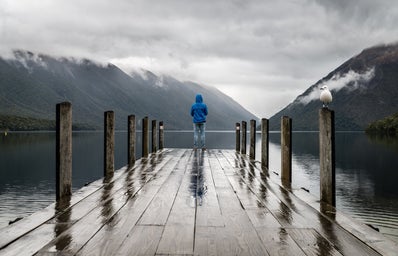In the grand scheme of things, I have what one might call a blessedly uneventful life. As a young child with a head full of fictional characters and fantastical adventures, this caused me no small degree of consternation. Or rather, when it came time to write the odd college application or scholarship essay, I spent hours sitting and staring at a blank document, wondering what I had been doing as the years passed me by. However, as I’ve grown older, I find myself increasingly fond of the fact that the most remarkable aspect about myself is that I am remarkably average. I am healthy and able-bodied, of sound mind, from a stable family background, can afford a generously comprehensive education, and from a decently well-off socioeconomic background. No, that was not meant as a perverse humble brag. Simply put, I’ve illustrated above that I come from no great tragedy, nor one-in-a-million, lightning-struck-twice instance of good fortune. And that’s okay. At least, I realise that it is okay now. In fact, I’m quite privileged. But that does not negate the years of grappling with the notion that instead of astoundingly average, I was inordinately insipid. That, instead of basic, I was just boring.
Quite frankly, these old fears flared up again more recently when a friend asked me for advice. While the act was no surprise, given my long tenure as the resident mom friend of the group, the five words managed to stump me with an efficacy I had not seen to date. How do you be alone? Her honest vulnerability was endearing, yet did nothing to distract my overactive mind from going on a rampage of rather illogical thought. I couldn’t help but wonder why she came to me specifically for this issue. Did I give off the impression that I was too good to spend time with people, or that my company was so superior I didn’t need anyone else’s? Patently untrue. Did others think I was always comfortable being alone, or that I was alone because other people didn’t like my bland company? The answers to those were not so clear. And in the end, she also got no clear answer.
Okay, grammatical and syntactical errors aside, my friend posed a rather valid point. She, like an increasingly large amount of people these days, has been having trouble with the social stagnation that has come with COVID-19 restrictions. Isolation hasn’t been easy for anyone, but I’ve definitely noticed a trend of it negatively affecting my more outgoing acquaintances. That being said, this is not exactly a new problem. Alone time is somewhat of a commodity–no, a luxury–in this late-stage capitalistic society built for only the most driven and outgoing. Some people fear being alone with their thoughts and will do almost anything to avoid such an outcome. Now, when faced with the inevitability of vast spans of ‘Me Time’, these people cannot help but grapple with a challenge they didn’t expect to confront any time soon: how one manages to be alone.
Rather than answer the question at hand, it may be better if one starts by asking why they are so uncomfortable to be alone? There could be hundreds of different responses, ranging from one’s upbringing to simply their personality. Emotional traumas aside, my not-so-hot take on the matter is that the inability to be alone is a skill and speaks to be comfortable in one’s own company. Not the easiest feat to achieve. I largely draw the distinction between those who can manage this and those who cannot by how ‘extroverted’ one is. Or, put more simply, how reliant one is on external stimuli for entertainment.
For my more extroverted friends, I can’t offer much advice outside the hope that one day this country can resume a feeble sense of normalcy. While not quite the same as parties, travel, or live entertainment, the world grows increasingly more connected thanks to technology. It is not impossible to connect with people through social media, communication apps, or even games.
Learning how to be alone is a skill that is integral to our growth the older we get. Part of it may have to do with the old hippie-dippy schtick of needing to truly love and accept ourselves to be content. While that is a valid argument at times, I find it a tad excessive (not to mention entirely too idealistic). A large part of why learning how to be alone is important is that the one person who you will always have–the person who will never leave and will always be there for you–is yourself. So why not take the steps to enjoy it?


